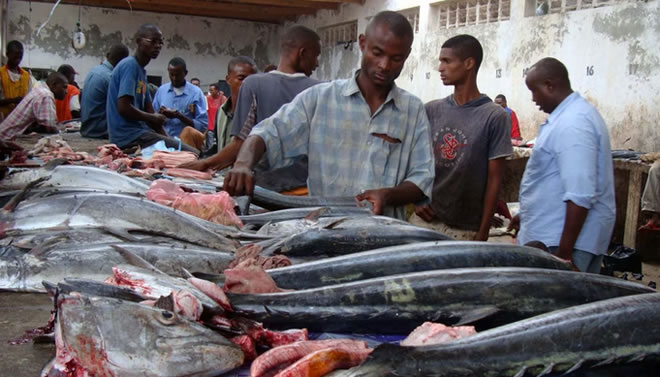by Dr. Ali Said Faqi
Sunday May 28, 2023

Somalia has a vast coastline of more than 3,300 km, the longest in the continent of Africa, which could make it a significant player in the blue economy. The blue economy encompasses a range of economic activities that are related to the oceans, seas, and coastal areas. These activities include fisheries, aquaculture, shipping, tourism, and renewable energy, among others. Somalia has a wide variety of fish species including tuna, mackerel, bream, mullet, snapper, grouper, etc. Also, the country has beautiful beaches and coral reefs, they could turn into a thriving tourist destination. There is a potential to develop these sectors and generate significant revenues, but the country is facing significant political and security challenges that are hindering its ability to harness the potential of its marine resources. These include illegal fishing, overfishing, and limited infrastructure.
Illegal Fishing
Somalia has been plagued by illegal, unreported, and unregulated (IUU) fishing for many years. The country's weak governance, lack of effective fisheries management, and the presence of foreign fleets have contributed to the problem. Some of the countries that have been accused of illegally fishing in Somali waters include:
1. China - Chinese fishing fleets have been accused of illegally fishing in Somali waters, and there have been reports of Chinese vessels using banned fishing gear and catching endangered species.
2. Taiwan - Taiwanese vessels have also been accused of illegal fishing in Somali waters, and there have been reports of Taiwanese vessels using illegal fishing gear and violating fishing regulations.
3. Spain - Spanish vessels have been caught illegally fishing in Somali waters, and there have been reports of Spanish boats using banned fishing gear and catching endangered species.
4. South Korea - South Korean fishing fleets have been accused of illegal fishing in Somali waters, and there have been reports of Korean vessels using illegal fishing gear and violating fishing regulations.
5. Yemen - Yemeni vessels have been caught illegally fishing in Somali waters, and there have been reports of Yemeni boats using banned fishing gear and catching endangered species.
6. Iran- Iranians have also been accused of illegal fishing in Somali waters. Iranian fishing vessels have been caught illegally fishing in Somali waters, and there have been reports of Iranian vessels using banned fishing gear and catching endangered species. In 2017, Somali authorities seized an Iranian fishing vessel for illegal fishing in Somali waters.
7. Egypt- Egyptian fishing vessels have also been accused of illegal fishing in Somali waters, and there have been reports of Egyptian boats using illegal fishing gear and violating fishing regulations. In 2019, Somali authorities seized an Egyptian fishing vessel for illegal fishing in Somali waters.
These countries, among others, have contributed to the overfishing and depletion of fish stocks in Somali waters, leading to serious ecological, economic, and social consequences for the country.
It is difficult to accurately estimate the financial loss caused by illegal fishing in Somalia due to the lack of available data. However, according to a 2018 report commissioned by the United Nations Environment Programme (UNEP), illegal fishing in Somalia is estimated to cost the country between $25 million and $30 million annually.
What should Somalia do to combat illegal fishing?
Combating illegal fishing in Somalia requires a multi-faceted approach involving various stakeholders including the government, local communities, and international organizations. Here are some strategies that could be effective:
1. Enhancing surveillance and monitoring: The Somali government should enhance its surveillance and monitoring capabilities to detect illegal fishing activities. This includes investing in technology such as satellite tracking, automatic identification systems (AIS), and other remote sensing technologies.
2. Security surveillance: Somali naval forces should patrol and increase security surveillance efforts to combat illegal fishing. By combating illegal fishing Somalia cannot only boost its economy but also contribute to the global effort to protect fish stocks and ensure sustainable fishing practices.
3. Strengthening the rule of law: The Somali government must strengthen its legal and regulatory framework to combat illegal fishing. This includes laws to prevent and prosecute illegal fishing, illegal licensing, and registration of vessels, and monitoring and surveillance of fishing activities.
4. Engaging local communities: Local communities should be engaged in the fight against illegal fishing. This includes educating them on the impact of illegal fishing on their livelihoods and the environment and encouraging them to report any illegal fishing activities they observe.
5. International cooperation: International community can play a major role by providing technical and financial assistance and enhancing international cooperation to prevent illegal fishing vessels from operating in Somali waters. Somalia can enter a joint effort with the USA or the EU to prevent illegal fishing in Somalia. Somalia can also enter in agreement with the European Union’s Common Fishery Policy and the Pacific Island’s Forum Fisheries agency, that work to coordinate efforts and promotes sustainable fishery practices.
The question of taking these countries to the International Court of
Justice (ICJ) in the Hague is plausible. Somalia has the right to bring a case against
countries that engage in illegal fishing in its waters at ICJ, provided that
the country in question has recognized the jurisdiction of the ICJ. However,
bringing a case to the ICJ can be a lengthy and expensive process and it may
not guarantee a favorable outcome. Therefore, Somalia should continue to work
on implementing effective measures to combat illegal fishing and engage in
diplomatic efforts to address the issue with the countries involved.
Dr. Ali Said Faqi
[email protected]